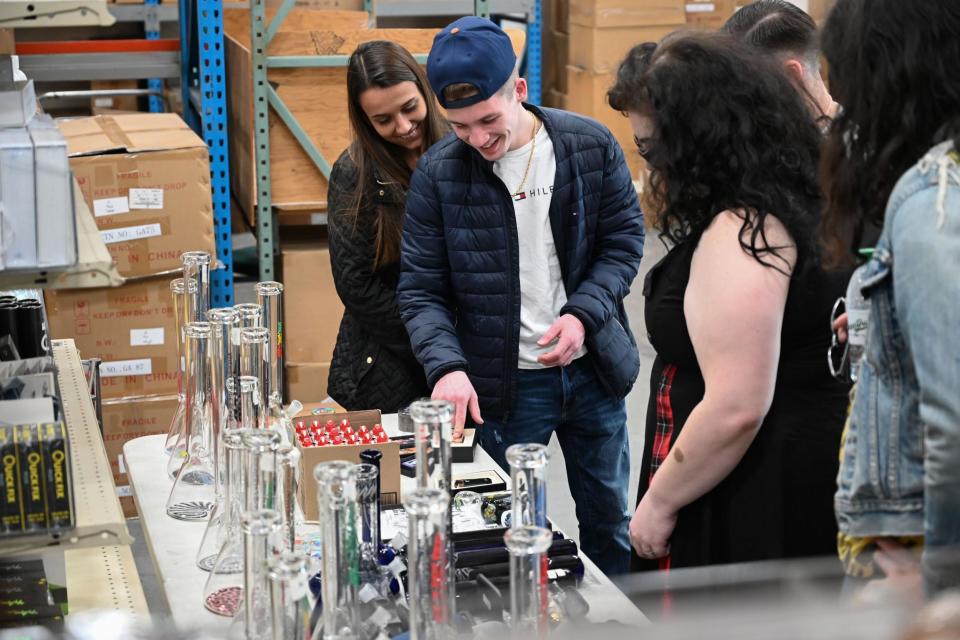The Reader: Legalising cannabis will lessen the harm it causes
The study you reported on this week [“Thousands of teenage cannabis smokers ‘at higher risk of depression’”, February 13] is one that must be taken seriously, irrespective of whether a causal connection has been established.
We know that in adolescence the maturing teenage brain is particularly vulnerable to the deleterious effects of many drugs. This risk is partially acknowledged in British law, with legally mandated point-of-sale age challenges for alcohol and tobacco. It is incoherent that no such safeguards are in place to protect children from the potential harm of cannabis.
Its class-B status does not stop it being the most popular illicit drug among teenagers — a Survation poll last year confirmed UK teens found it easier to acquire than alcohol. This is unsurprising since, in a market controlled by criminals, vendors don’t ask for ID.
Since various US states started legalising cannabis in 2014, its use by adolescents has dropped. Last month, it was at its lowest since 1994. Such moves do not “send the wrong message” but rather allow greater control over messaging. The clear and graphic health warnings on cigarettes — only possible in a legal market — have directly contributed to the recent decrease in smoking. Those who are serious about reducing the harms associated with cannabis use should prioritise evidence over ideology, and move to legally regulate its sale.
Eddie Jacobs
Policy Officer, The Beckley Foundation
EDITOR'S REPLY
Dear Eddie
I agree that any link between cannabis use and depression among adolescents is of serious concern but I’m not convinced by your argument.
To begin with, it is hard to imagine that the state could permit the consumption of the most harmful “skunk” variants of the drug, other than possibly in tiny amounts, when the provision of larger quantities would lead to the very health problems you want to avoid. That means an unregulated, criminal market would still exist to supply those who wanted more or stronger forms of cannabis.
The latest figures from the Office for National Statistics show that although cannabis use has risen slightly in recent years, the long-term trend is down. So far as evidence versus ideology is concerned, it seems to me that those who advocate drug legalisation are often the most inflexibly committed to their beliefs. There’s no perfect answer to this problem but giving a green light to self-harm looks to me like a mistake.
Martin Bentham, Home Affairs Editor
Churchill was no villain, McDonnell
You have to hand it to shadow chancellor John McDonnell, he never misses an opportunity to miss an opportunity.
When he could be pragmatic and sensible he chooses the opposite. When asked whether Churchill was a “hero or villain” he chose “villain”, because in 1910, Churchill, when Home Secretary, deployed troops during a miners’ strike in south Wales. Was Churchill wrong to do so? Without question he was.
But to describe Churchill as a historical “villain” is to ignore the enormity of his achievement in galvanising Britain to stand alone in 1940 to fight Hitler and the Nazis. If Lord Halifax had become prime minister in 1940 this country would have sued for peace and allowed the twisted ideology of Nazism complete control of Europe.
It is ironic that John McDonnell uses his right to free speech to disrespect Churchill, the very man who secured those freedoms that McDonnell, and all of us, so readily enjoy.
David Doe
Social care crisis not down to Brexit
Repeated delays to the publication of the social care green paper cannot be excused by Brexit [“Brexit has delayed plans to deal with adult social care crisis, minister admits,” February 12]. With every delay, the 850,000 people with dementia are being further neglected by a broken system.
The possible impact of post-Brexit immigration rules on the social care workforce is enough to prompt immediate action. The most vulnerable in our society should not be made to wait any longer — and we urge the Government to act now.
Sally Copley
Alzheimer’s Society
Children now have new idols
I read with interest your story on VidCon [“£145 to learn to be online star with Joe Sugg at YouTube expo,” February 13].
Older readers may wonder why anyone would pay to meet someone they haven’t heard of but attendees of VidCon are paying for the chance to learn more about — and possibly meet — their idols.
Children pay to see their favourites, and their favourites are no longer television or pop stars.
Chris Stokel-Walker
Tech journalist and author of the upcoming book YouTubers

 Yahoo News
Yahoo News 

